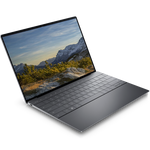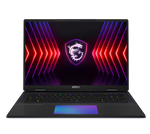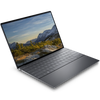A comparison of specs, key information, reviews, and best pricing from top retailers
Last updated -- hours ago | Report incorrect information
What we think

The PerfectRec laptop team Learn more
Updated March 22, 2024·
If you're on a budget and value portability, the Dell XPS 13 Plus offers a more affordable and lightweight option, suited for everyday tasks and general use, with the tradeoff being less suited for heavy gaming or engineering software, which require more powerful hardware. On the other hand, the MSI Titan 18 HX, while heavier and more expensive, is tailored for high-end gaming, 3D modeling, machine learning, and other intensive tasks, providing top-notch performance but with a potential impact on battery life and ease of carrying around. Choose based on whether cost savings and portability or performance for demanding applications is your priority. Give Feedback
this description is based on the product variant with some specs and product variant with some specs. At the time of writing, the variant with some specs cost some dollars and the variant with some specs cost some dollars.
Advantages of the Dell XPS 13 Plus
- Excellent portability
- Very good battery life
- Best in class speakers
Advantages of the MSI Titan 18 HX
- Best in class for engineering and design
- Excellent for gaming and AI
- Excellent for content creation
- Excellent overall display quality
- Best in class keyboard
Key differences
Gaming and AI
6.4


9.4
3.8/10
OVERALL GPU SCORE
9.9/10
3840 x 2400
RESOLUTION
3840 x 2400
60Hz
REFRESH RATE
120Hz
No
SUPPORTS DLSS
Yes
No
MUX SWITCH / ADVANCED OPTIMUS
Yes
8.7/10
FAN NOISE SCORE
7.0/10
The MSI Titan 18 HX is excellent for gaming and AI, while the Dell XPS 13 Plus is only fair.
The Dell XPS 13 Plus has a lower-performing integrated GPU and a standard screen refresh rate, making it less ideal for high-end gaming and 3D applications. On the other hand, the MSI Titan 18 HX boasts a powerful dedicated GPU and a high refresh rate display, which are crucial for smooth, detailed gaming and 3D rendering performance.
Engineering and Design
8.2


9.9
7.9/10
OVERALL CPU SCORE
9.9/10
3.8/10
OVERALL GPU SCORE
9.9/10
32.0 GB
RAM
128.0 GB
The MSI Titan 18 HX is best in class for engineering and design, while the Dell XPS 13 Plus is very good.
The Dell XPS 13 Plus, with its high-quality CPU, ample RAM, and solid GPU, offers strong performance and a vibrant screen in a lightweight, compact form, making it ideal for on-the-go engineering tasks, but it may struggle with heavy 3D simulations. In contrast, the MSI Titan 18 HX, with its top-tier CPU, expansive RAM, powerful GPU, and exceptional screen resolution, excels in demanding engineering and design applications, but its larger size and heavier weight reduce its portability.
Content Creation
8.3


9.0
7.9/10
OVERALL CPU SCORE
9.9/10
3840 x 2400
RESOLUTION
3840 x 2400
32.0 GB
RAM
128.0 GB
OLED
DISPLAY TECHNOLOGY
Mini LED
The MSI Titan 18 HX is excellent for content creation, while the Dell XPS 13 Plus is very good.
PerfectRec’s Content Creation Score takes into account the many different features of the laptop that make it more or less suitable for photo editing, video editing and other content creation tasks.
Software Development
8.3


8.9
7.9/10
OVERALL CPU SCORE
9.9/10
32.0 GB
RAM
128.0 GB
3840 x 2400
RESOLUTION
3840 x 2400
9.0/10
KEYBOARD QUALITY SCORE
10.0/10
The MSI Titan 18 HX and Dell XPS 13 Plus are both very good for software development, though the MSI Titan 18 HX is somewhat better.
PerfectRec’s Software Development Score takes into account the many different features of the laptop that make it more or less suitable for software developers.
Screen Quality
8.4


9.2
13.4in
SIZE
18.0in
3840 x 2400
RESOLUTION
3840 x 2400
OLED
DISPLAY TECHNOLOGY
Mini LED
60Hz
REFRESH RATE
120Hz
374.0 nits
BRIGHTNESS
401.0 nits
The MSI Titan 18 HX has a better screen than the Dell XPS 13 Plus for general use, gaming and AI, engineering and design, content creation, and software development.
For general use, the Dell XPS 13 Plus offers a sharp and bright display with good color reproduction, making it pleasant for daily activities such as browsing and video streaming, while the MSI Titan's top-notch resolution and brightness provide an even more vibrant and clear visual experience. In engineering and design, the XPS 13 Plus delivers accurate colors within various professional color spaces, but the MSI Titan excels with wider color coverage, crucial for detail-oriented tasks like photo editing or CAD work. However, for gaming and 3D applications, both laptops fall short due to lower refresh rates, which means less smooth motion and responsiveness compared to models specifically designed for these purposes.
Battery
10.0 Hours


4.0 Hours
The Dell XPS 13 Plus has 10 hours of battery life. The MSI Titan 18 HX has 4 hours of battery life.
Battery life estimate is based on a mix of common use patterns. More portable and higher performing laptops tend to have less battery life.
Portability
Excellent


Poor
13.4in
SIZE
18.0in
2.7 lbs
WEIGHT
7.9 lbs
0.6in
THICKNESS
1.2in
The Dell XPS 13 Plus has excellent portability, while the MSI Titan 18 HX has poor portability.
The most portable laptops are small, thin, and light.
Cost
$1,849


$4,949
$500
$1,000
$1,500
$2,000
$2,500
$3,000
$3,500
$4,000
The Dell XPS 13 Plus has a price of $1,849 and the MSI Titan 18 HX costs $4,949.

Let Us Help Find Your Perfect Laptop
Find your new laptop
Key similarities
General Use
8.4


8.8
3840 x 2400
RESOLUTION
3840 x 2400
OLED
DISPLAY TECHNOLOGY
Mini LED
374.0 nits
DISPLAY BRIGHTNESS
401.0 nits
10.0 Hours
BATTERY LIFE
4.0 Hours
9.0/10
KEYBOARD QUALITY SCORE
10.0/10
9.1/10
PORTABILITY SCORE
5.0/10
The MSI Titan 18 HX and Dell XPS 13 Plus are both very good for general use.
The Dell XPS 13 Plus offers a balance of powerful CPU, ample RAM, and high-quality screen while remaining lightweight and with longer battery life, making it ideal for users who prioritize portability and general use. The MSI Titan 18 HX, on the other hand, leans more towards users looking for top-tier performance in CPU and RAM for demanding tasks, with less emphasis on portability and battery life due to its larger screen and more robust build.
Build Quality
8.5


8.5
The Dell XPS 13 Plus and MSI Titan 18 HX both have very good build quality.
PerfectRec’s Build Quality Score incorporates case materials, display and keyboard flex, hinge quality, and overall reliability.
Give feedback
We’re constantly working to improve.
How the Dell XPS 13 Plus and the MSI Titan 18 HX compare to other laptops
Spec Comparison
| Dell XPS 13 Plus | MSI Titan 18 HX |
GENERAL | |||
|---|---|---|---|
| Price | |||
$1,849 | $4,949 | ||
Release Date | |||
Release Date | May 1, 2022 | February 1, 2024 | |
Overall Dimensions | |||
Overall Dimensions | 11.6'' x 7.8'' x 0.6'' | 15.9'' x 12.1'' x 1.26'' | |
Weight | |||
Weight | 2.71 lbs | 7.93 lbs | |
Width | |||
Width | 11.63" | 15.9" | |
Depth | |||
Depth | 7.84" | 12.08" | |
INTERNAL | |||
|---|---|---|---|
Processor | |||
Processor | Intel i7-1280P | Intel i9-14900HX | |
RAM | |||
RAM | 32 GB | 128 GB | |
DDR Memory Version | |||
DDR Memory Version | 5 | 5 | |
RAM Slots | |||
RAM Slots | 0 | 4 | |
Storage | |||
Storage | 512 GB | 4096 GB | |
BATTERY | |||
|---|---|---|---|
Battery Life | |||
Battery Life | 10 Hours | 4 Hours | |
Battery Capacity | |||
Battery Capacity | 55 Wh | 99.9 Wh | |
SCREEN | |||
|---|---|---|---|
Diagonal Size | |||
Diagonal Size | 13.4" | 18" | |
Display Technology | |||
Display Technology | OLED | Mini LED | |
Resolution | |||
Resolution | 3840 x 2400 | 3840 x 2400 | |
Refresh Rate | |||
Refresh Rate | 60Hz | 120Hz | |
Display Brightness | |||
Display Brightness | 374 nits | 401 nits | |
RELIABILITY, APPEARANCE & ACOUSTICS | |||
|---|---|---|---|
Build Quality Score | |||
Build Quality Score | 8.5/10 | 8.5/10 | |
Portability Score | |||
Portability Score | 9.2/10 | 5.1/10 | |
Gaming Laptop Appearance | |||
Gaming Laptop Appearance | No | Yes | |
Premium Business Laptop | |||
Premium Business Laptop | No | No | |
Fan Noise Score | |||
Fan Noise Score | 8.8/10 | 7/10 | |
HARDWARE FEATURES | |||
|---|---|---|---|
Keyboard Quality Score | |||
Keyboard Quality Score | 9/10 | 10/10 | |
Speaker Quality Score | |||
Speaker Quality Score | 9.5/10 | 9.1/10 | |
Webcam | |||
Webcam | 720p | 1080p | |
Fingerprint Reader | |||
Fingerprint Reader | Yes | Yes | |
Backlit Keyboard | |||
Backlit Keyboard | Yes | Yes | |
Number Pad | |||
Number Pad | No | Yes | |
CONNECTIVITY | |||
|---|---|---|---|
USB Type-A | |||
USB Type-A | 0 | 3 | |
USB-C ports | |||
USB-C ports | 2 | 2 | |
USB-C Charging | |||
USB-C Charging | Yes | Yes | |
Display Outputs | |||
Display Outputs | 2 | 3 | |
Thunderbolt Version | |||
Thunderbolt Version | 4 | 4 | |
Shopping
Dell XPS 13 Plus
See more
Dig into reviews and images
NotebookCheck
Andreas Osthoff | July 2022
"The XPS 13 Plus is powerful, but has its drawbacks. Dell did not only update the processor generation, but also decided to offer two completely different models from now on. The XPS 13 Plus gets the faster Intel Alder Lake-P chips, and the Core i7-1260P in our review unit offers good performance figures. However, the device once again shows the problems of the current Intel CPUs, because the high performance requires a lot of power. This affects the battery runtime as well as temperatures, so the new model (even with the Optimized power profile) is louder than the older model."
MSI Titan 18 HX
See more
Dig into reviews and images
NotebookCheck
Allen Ngo | January 2024
"With no new Nvidia GPU this year for laptops, MSI had to refresh everything surrounding the graphics card to make up for it. Users are getting a new 18-inch chassis design, new 14th gen Intel HX CPU, new AC adapter, larger keys, and a new 120 Hz HDR1000 mini-LED 4K display to accompany the high price tag. Most of these changes are a step up from last year's GT77, but users are ultimately getting the same gaming performance out of both models."
Get a great deal on the Dell XPS 13 Plus or the MSI Titan 18 HX
About Dell
Dell is a highly recognizable American technology company, and is one of the largest personal computer vendor by market share. Their laptops are very popular for both personal and professional use, and they also own the Alienware brand which makes mid to high end gaming laptops. Their premium XPS range of laptops offer great build quality and portability, while Latitude and Precision laptops are known for reliability, repairability and performance for business users.
About MSI
MSI, also known as Micro-Star International, is a Taiwanese technology corporation. MSI is known for their wide range of gaming devices. Their series include the entry-level Cyborg/Thin and Sword/Katana series, the mid-range Bravo/Delta and Crosshair/Pulse series, and their high-end Vector, Raider, Stealth, and Titan GT series. At every performance level, MSI offers a variety of devices with varying balances between performance, battery life, weight, and price, making them a solid option to consider at every price point.
Give feedback
We're constantly perfecting our model
Laptop guides you might be interested in
More comparisons for you
FAQs
FAQs about laptops
Why trust us
This information was produced and vetted by the PerfectRec laptops team. We are a product research and recommendation organization that meticulously reviews and evaluates the latest laptop information and makes it digestible for you.
By the numbers
380
Laptops evaluated
48,640
Laptops stats compiled
13
Proprietary Laptops ratings developed
132,195
Recommendations made
28,643
Consumer hours saved
About the laptop team
Joe Golden, Ph.D
CEO and Laptops Editor
Joe is an entrepreneur and lifelong electronics enthusiast with a Ph.D in Economics from the University of Michigan.
Jason Lew
Staff Expert & Software Engineer
Jason is a staff expert and software engineer that has been making laptop recommendations for 7 years and moderates one of the largest laptop subreddits.
Chandradeep Chowdhury
Staff Expert & Software Engineer
Chandradeep is a staff expert and software engineer and expert in televisions and monitors. He’s been making monitor recommendations for ten years.
Craig Russell
Laptops Expert
Craig is a UK-based laptops expert. Craig works in IT, where he recommends and supports laptops and PCs for clients and has been recommending laptops on Reddit for five years.







